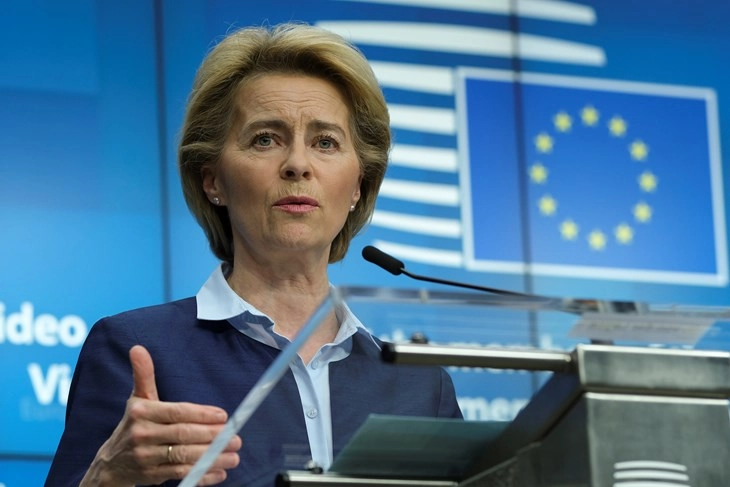EU Commission backs starting membership talks with Bosnia-Herzegovina
- The European Commission on Tuesday formally advised EU leaders to open talks with Bosnia-Herzegovina about joining the European Union.
- Post By Ivan Kolekevski
- 08:43, 13 March, 2024

Strasbourg, 13 March 2024 (dpa/MIA) - The European Commission on Tuesday formally advised EU leaders to open talks with Bosnia-Herzegovina about joining the European Union.
"Bosnia and Herzegovina has taken impressive steps forward. More progress has been achieved in just over a year than in a whole decade," commission president Ursula von der Leyen said in a speech early on Tuesday, ahead of the decision.
The announcement means the EU executive is satisfied that Bosnia-Herzegovina has met the necessary criteria to open negotiations on it joining the EU. However, the decision to begin talks needs unanimous approval from the leaders of the 27 EU member states. They are scheduled to meet in Brussels on March 21 and 22.
"Today, the European Commission recommended to open EU accession negotiations with Bosnia and Herzegovina," a commission press release said on Tuesday.
The commission is still expected to publish a progress report at some point later on Tuesday detailing how Bosnia-Herzegovina has met the necessary criteria.
Bosnia-Herzegovina applied to join the EU in 2016, and EU leaders recognized it as a candidate for membership in 2022. In November, the commission said accession talks should begin once the country had fulfilled certain criteria.
In her speech at the European Parliament in Strasbourg, von der Leyen said Bosnia-Herzegovina - one of the six former republics of Yugoslavia - "is now fully aligned with [the EU's] foreign and security policy, which is crucial in these times of geopolitical turmoil."
She added that the country had passed "important laws" on matters such as preventing conflicts of interest, money laundering and terrorist financing. Bosnia-Herzegovina's management of migration "continues to improve," von der Leyen said.
She also lauded progress "on dialogue and reconciliation" over the 1992-95 Bosnian War, and noted that "the Ministry of Justice has agreed to include in the domestic criminal records the judgements of the International Criminal Tribunal for the former Yugoslavia."
Bosnia-Herzegovina and Kosovo are the only Western Balkan countries that have not yet entered into formal accession talks with the EU.
"We have shifted gear in our approach to the region. We have realized that this is not enough to just wait for the Western Balkans to move closer to us," von der Leyen said on Tuesday.
"It is not enough to say that the door is open. We must also take responsibility and support their path towards our union in any possible way," she said.
"This is why we have opened accession negotiations with Albania and North Macedonia. And this is why we have committed to doing the same with Bosnia and Herzegovina."
The first Western Balkan country to join the EU, Slovenia, was one of 10 new members that acceded in 2004. Croatia joined in 2013.
The EU opened negotiations with Serbia and Montenegro in 2012, and with Albania and North Macedonia in 2022.
Kosovo applied to join the EU in 2022. However, five EU countries - Cyprus, Greece, Romania, Slovakia and Spain - do not recognize Kosovo, which declared independence from Serbia in 2008.
Outside the Western Balkans, Ukraine, Moldova, Georgia and Turkey are also official candidates for EU membership. In December, the EU decided to open accession talks with Ukraine and Moldova, and to grant formal candidate status to Georgia.
On Tuesday, the commission also proposed draft negotiating frameworks for the forthcoming talks with Ukraine and Moldova.
The two frameworks establish the principles governing the talks, the substance of negotiations and the procedures they'll follow, the commission's press release said.
Like the decision to open talks in the first place, these proposals still need the approval of EU leaders. After that, they will be used to open the first rounds of negotiations with Kiev and Chișinău. They won't be made public until then.
Turkey has been a candidate for EU membership since 1999 and accession talks opened in 2005, but have stalled due to concerns about authoritarianism under President Recep Tayyip Erdoğan.
Turkey also does not recognize Cyprus, which is a member of the EU, but it is the only country in the world that recognizes the breakaway Turkish Republic of Northern Cyprus.
MIA file photo







